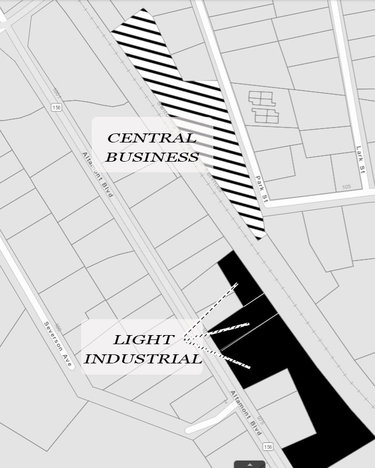Split Altamont board nixes rezone of 120 Park Street
ALTAMONT — The village board at its monthly meeting, in a 3-to-2 decision, voted against holding a public hearing on rezoning 120 Park Street from Central Business District to Industrial. This halts, at least for now, JNT Development’s plan to build an apartment complex at the heart of the village.
At the April 9 meeting, trustees Michelle Ganance, John Scally, and Dean Whalen voted against the measure, while Mayor Kerry Dineen and Trustee Nicholas Fahrenkopf were in favor of holding a public hearing.
The next step for JNT Development — the requester of the rezone — could be to again ask for a rezone or present a project that fits with the current zoning.
“Obviously, I’m disappointed that we weren’t allowed to public hearing,” Jeff Thomas, owner of JNT Development told The Enterprise. “These are elected officials and I respect their decision. I would have liked the chance to have spoken in public regarding our proposed idea for the site.”
In December 2018, Thomas proposed a three-building mixed-use development of 26 one- and two-bedroom apartments and 3,600 square feet of commercial space. In his most recent application for a change of zone, he was seeking only to construct multi-family apartments on the site.
Last month’s village election had turned on the village board’s rezoning a residential property into a commercial one so that Stewart’s shops could expand. Incumbents Ganance and Fahrenkopf had voted, along with the mayor, for the Stewart’s rezone. They were re-elected in a close race where the challengers had touted environmental responsibility.
When asked what he will do next, Thomas said that he doesn’t want to build anything that the village doesn’t want, but he’d also like the opportunity to sit down with village board members and discuss what they feel the village needs.
“I think that there’s a great opportunity there,” he said of 120 Park Street.
During Tuesday’s meeting, Whalen asked that the board not even consider the motion to hold a public hearing on the rezone because, he said, “I don’t think it’s appropriate as proposed.”
Later, Whalen, an architect who led the committee that drafted the comprehensive plan, said that the plan is the guideline and it established the zoning as Central Business District, and he didn’t see a need to address the zoning of the parcel, “particularly given some of the constraints.”
“There’s nothing saying we have to have [a public hearing], correct?” Ganance asked. “Because I agree with [Whalen] 100 percent,” that a public hearing should not be held.
Scally had inquired about the constraints earlier in the meeting, specifically, he asked if the rezone would qualify as spot zoning.
Whalen told him that it is not a case of spot zoning because 120 Park Street does abut an industrial zone because the boundaries of the parcels are technically the centerline of the railroad tracks so, “by about five to 10 feet on one corner in each zone,” the properties technically connect.
Fahrenkopf was in agreement with Ganance, Scally, and Whalen, that the type of rezone that would take place was a bad plan.
“Light industrial right next to a library and park is a terrible idea,” he said; however, why not give Thomas the “benefit of a chance” to present his case to the board, Fahrenkopf asked. A public hearing would allow the board an opportunity to hear from the community and to further discuss the proposal.
“I’d like to be responsible and at least look; consider it,” Fahrenkopf said. Board members voiced approval about considering the plan and holding a public hearing but then voted down the May 7 hearing.
Addressing concerns
Thomas said that there is a large demand for rental apartments in the village, he owns eight units across the street from the library that are always occupied. “We get calls each month; we turn away people each month,” he said.
He said that he had been working on addressing the planning board’s concerns. One of its biggest concerns had been that the parking lot of the Altamont Free Library would be used as an entrance and exit to the development.
On that issue, Thomas said that he had a plan for a gate that could only be used by first responders.
He also said that the project would have fewer apartments, housed in two buildings rather than the three he had proposed originally. The apartments, he said, would also have a variety; one-bedroom units would be available as would four-bedroom units.
He added that one fewer building would have meant more green space and enough on-site parking to satisfy zoning regulations.
“And one other thing,” Thomas said, was the planning board’s concern that the rezone might happen and a project would never be built on the site. For that, he said, he was going to propose that the village board use language that said, if his project never happened, the property would revert to its prior zoning designation.
Thomas said that he used the same provision when he built Mill Hollow Apartments in Guilderland. But he acknowledged that the legalities would have to be worked out with the village attorney.




Thanks to the Village Board. You are a board that pays attention to what your Village wants and doesn't want. Jeff Thomas has done a lot of good for our community, but this was not a good idea.